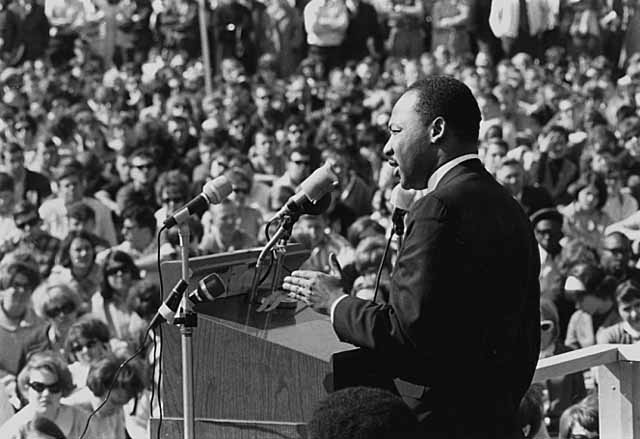Culture, Entertainment, Features, Media
How Dr. Martin Luther King Jr.’s Legacy Changed Pop Culture
“The media can be the most powerful entity on earth. They have the power to make the innocent guilty and to make the guilty innocent, and that’s power. Because they control the minds of the masses,” said Dr. Martin Luther King Jr., one of the most influential leaders of the civil rights movement. And while Dr. King’s impact across social and political landscapes is well-known, there are fewer discussions that honor his impact on media and the entertainment industry.
Dr. King was a poetic orator who reached millions through television and radio. While his “I Have a Dream” speech is known as one of the most important in American History, it was one of many that gave more context to the depth of his work – some of his speeches were recorded as albums.
In the 1950s and 1960s, mediums for visual and audio distribution were broadcasting Dr. King’s actions and words to the country, shifting public knowledge and opinion about the racism and violence against Black Americans on a daily basis. Through media visibility of boycotts organized by Dr. King and other civil rights leaders (such as Malcolm X and John Lewis), the pressure was on for the government to prioritize nationwide calls for justice.
Dr. King’s popularity across all media platforms would begin to cross over into pop culture.
In the years before the civil rights movement, the entertainment industry was dominated by White performers and creators, with little room for actors, musicians, or writers of color. Because Dr. King was one of the most prominently featured figures in numerous movies and TV shows that portrayed the civil rights movement, the industry was forced to confront issues of race and representation.
More Black musicians started speaking up through their art. Nina Simone and James Brown wrote songs inspired by Dr. King’s activism that became anthems of the civil rights movement and spread the demand for justice to an even wider audience.
Before the civil rights era, music venues were segregated and Black musicians had less opportunities in comparison to White musicians. However, the rise of civil rights activism slowly started to change the dynamics with musicians like Ray Charles and Aretha Franklin becoming household names. Their music would help break down racial barriers and further elevate Black culture into the mainstream.
Dr. King’s role in the civil rights movement helped diversify films, television shows and theater.
African American performers were relegated to racist stereotypical roles as maids or buffoons before the civil rights movement, but Hollywood’s misrepresentation of Black culture gave way to actors like Sidney Poitier, who starred in over 30 films and was the first Black performer to win the Oscar for Best Actor.
Dr. King helped to pass the Civil Rights Act of 1964. Before the anti-discrimination bill was signed into law by President Lyndon B. Johnson, Diahann Carroll starred in the 1962 musical No Strings that centered her character as a fashion model in an interracial romance. Carroll held this leading role at a time when Dr. King advocated for desegregation, which was a dangerous point of contention in the country. She became the first Black actress to win a Tony.
The civil rights movement also had a significant impact on the theater industry. August Wilson, who was inspired by the movement and Dr. King, co-founded the Black Horizons Theatre in 1968 and won numerous awards for his work. The Black Horizons Theatre was a community space that set the stage for Black stories to be told from lived experience and helped more Black actors and playwrights rise to fame.
With Dr. King and the civil rights movement came the rise of Black comedy.
The civil rights movement also had a profound effect on the comedy industry and made space for the emergence of Black comedy in the 1960s. Notably, comedian Dick Gregory was working closely with Dr. King. Gregory used his comedy platform to support the civil rights movement, performing at fundraisers and helping with voter registration. These were just a few of Gregory’s efforts as he stood firm in support of the movement. The burgeoning Black comedy genre was further amplified by comedians like Richard Pryor and Redd Foxx, who challenged the negative stereotypes placed on Black people.
As these Black comedians used their comedy for social commentary and to address racial inequalities, they were breaking ground for more Black comedians to gain exposure across the country.
Dr. King’s legacy continues to influence media and pop culture.
As a leader of the civil rights movement in the 1950s and 1960s, Dr. King’s work brought new voices and perspectives to the cultural mainstream. When he used the media to further civil rights, he inspired artists and media insiders across all genres to do the same for social justice. This changed the entire entertainment industry.
Dr. Martin Luther King Jr.’s legacy continues to shape the industry for entertainment professionals and audiences. There is no shortage of work remaining, but Dr. King’s visibility in the civil rights movement has undoubtedly propelled us into a new era of representation and inclusivity on big screens and stages across America.



